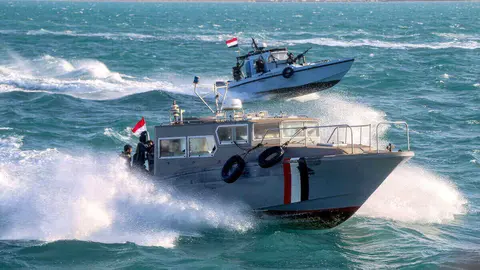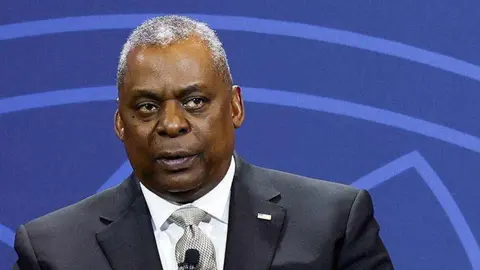US shoots down several Houthi drones and missiles in the Red Sea

The creation of a US-led international coalition to protect trade in the Red Sea does not seem to be intimidating the Houthis, who continue to threaten ships transiting the area. At least two more ships have been attacked by drones and missiles launched by Yemeni rebels backed by the Islamic Republic of Iran in recent hours, one of them north of the port of Al Hudeida, according to the British Royal Navy.
- Israel assassinates senior Iranian Revolutionary Guard officer in Syria
- The war is expanding on 'multiple fronts'
- Hamas rejects a permanent ceasefire in order not to relinquish its power in Gaza
The Houthis have confirmed one of the attacks, against the commercial vessel MSC United, was carried out with "appropriate naval missiles". "The attack on the ship came after its crew rejected calls from the (Houthi) navy for the third time, as well as repeated fire warning messages," the group's military spokesman, Yahya Sarea, said on Al Masirah TV.
US naval forces, meanwhile, have managed to shoot down several drones and missiles launched by the Houthis against targets in the Red Sea, as announced by the US Central Command.
U.S. assets, to include the USS LABOON (DDG 58) and F/A-18 Super Hornets from the Eisenhower Carrier Strike Group, shot down twelve one-way attack drones, three anti-ship ballistic missiles, and two land attack cruise missiles in the Southern Red Sea that were fired by the… pic.twitter.com/vRQ5e6Au6d
— U.S. Central Command (@CENTCOM) December 26, 2023
US forces in the area, which include USS LABOON (DDG 58) and F/A-18 Super Hornets of the Eisenhower Carrier Strike Group, shot down 12 one-way attack drones, three anti-ship ballistic missiles and two land-attack cruise missiles in the Red Sea, CENTCOM explains on social media. "There was no damage to ships in the area and no injuries were reported," it adds in the statement, which also blames the Houthis for the attacks.
In addition to US naval forces, Egyptian air defence systems have also shot down a drone near the Red Sea town of Dahab. Earlier this month, Egypt intercepted another drone in the same area, one of the country's main tourist hotspots. Also in late October, two Houthi drones struck Taba and Nuweiba, injuring at least six people.
The same day, the Egyptian media shows a missile launched by Houthis in Yemen intercepted over tourists in Dahab beach resort in South Sinai governorate https://t.co/q0gzbGNNi5 pic.twitter.com/SUj1RAPikF
— Gaza Report - اخبار غزة (@gaza_report) December 26, 2023
These attacks on Egyptian territory were probably aimed at the Israeli city of Eilat, the Houthis' main target and where they have launched several missiles and drones since the war between Israel and Hamas began. Again in the last few hours, the Israeli army has shot down a "hostile aerial target" bound for the coastal city.
The Houthis have confirmed the attack, calling it "a military operation with several drones against military targets" as part of "continuous support for the Palestinian people in accordance with religious, moral and humanitarian duty".
Israel assassinates senior Iranian Revolutionary Guard officer in Syria
As tension mounts in the Red Sea over hostile Houthi actions, fears are growing that the conflict between Israel and Hamas could expand regionally after an Israeli air strike killed Seyyed Razi Moussavi, a senior Iranian Revolutionary Guard officer in Syria.
Tehran has vowed that Israel will "undoubtedly pay for this crime", while Iran-backed Hezbollah has branded Moussavi's killing a "blatant and flagrant violation, which is out of bounds". "Tel Aviv faces a tough countdown," tweeted Iranian Foreign Minister Hossein Amir-Abdollahian.
Video shows the aftermath of an Israeli airstrike in the vicinity of Sayyeda Zeinab neighborhood in the Syrian capital Damascus which led to the martyrdom of Iranian veteran military advisor Seyyed Razi Mousavi. pic.twitter.com/AyC47CI25t
— Press TV (@PressTV) December 25, 2023
According to official Iranian media, Mousavi was "one of the most senior advisers to the Revolutionary Guards in Syria" and close to former Quds force chief Qassem Soleimani, who was killed in a US drone strike in Iraq in 2020.
Mousavi was also in charge of coordinating the Iranian-Syrian military alliance and arming Tehran-linked militias such as Hezbollah.
Photos of senior IRGC commander in #Syria, general Seyyed Razi Mousavi, next to #Iran’s late Quds Force commander Qassem Soleimani and current Quds Force commander Qaani. He was killed in an Israeli strike in Syria. https://t.co/mDLlRAWvuJ pic.twitter.com/BoTDJXKefy
— Iran Nuances (@IranNuances) December 25, 2023
The war is expanding on 'multiple fronts'
The Lebanese Shi'ite group has been launching attacks against northern Israel since the beginning of the war, prompting the evacuation of thousands of people from the area, as well as Israel's military response. One of Hezbollah's latest attacks hit the St Mary's Greek Orthodox Church in Iqrit, wounding an 80-year-old civilian.
El proxy más importante de Irán 🇮🇷 en el Medio Oriente, Hezbolá de Líbano🇱🇧 (aporte financiero de 700 millones de dólares anualmente por Irán🇮🇷), atacó hoy con un misil anti tanque la Iglesia griega-ortodoxa de Santa María en Iqrit, norte de Israel. https://t.co/JxPCQgxsq9
— Embajador Gali Dagan (@galida12) December 26, 2023
Israel has also accused Hizbollah of launching a missile from near a mosque in Yaroun in southern Lebanon. "This is further evidence of Hezbollah's cynical exploitation of Lebanese civilians and holy sites for its terrorist activity," the Israel Defence Forces stresses.
So far, the border clashes have resulted in the deaths of four Israeli civilians, as well as the deaths of nine soldiers. On the other hand, 126 Hezbollah members have been killed by Israel, mostly in Lebanon but some also in Syria. On Lebanese territory, 16 Palestinian terrorists, one Lebanese soldier and at least 17 civilians, three of them journalists, have also been killed, as reported by The Times of Israel.
Hezbollah fired from within a mosque in southern Lebanon toward Israeli civilians.
— Israel Defense Forces (@IDF) December 26, 2023
This is not Hezbollah’s first attack involving a holy site today.
Places of worship should be sacred, not sacrificed for terrorism. pic.twitter.com/ss3RQvtI2G
The north is just one of the many fronts Israel is fighting on. As Israeli Defence Minister Yoav Gallant has pointed out, the war is expanding on "multiple fronts" with attacks from seven points: Gaza, Lebanon, Syria, the West Bank, Iraq, Yemen and Iran.
Defense Minister Yoav Gallant says Israel is being attacked from seven separate theaters amid the ongoing war in the Gaza Strip, and the military has so far responded in six of them.
— Emanuel (Mannie) Fabian (@manniefabian) December 26, 2023
"We are in a multi-front war, we are being attacked from seven different arenas: Gaza, Lebanon,… pic.twitter.com/IBQVG4Wt5p
Hamas rejects a permanent ceasefire in order not to relinquish its power in Gaza
Moreover, according to Israel's chief of staff, Herzi Halevi, the war could last "many months". "There are no magic solutions, there are no shortcuts to dismantling a terrorist organisation, only determined and persistent fighting," Halevi said from the Gaza border, where Israel is conducting an air and ground military operation.
The offensive, which began after Hamas killed 1,200 people and kidnapped 240 on 7 October, has left nearly 21,000 Gazans dead in Gaza, according to Hamas-controlled health authorities.
IDF Chief of Staff Herzi Halevi: “We will not return to a pre-10/7 reality.”
— Eli Kowaz (@elikowaz) December 26, 2023
“The war will continue for many months, and we will operate with different tactics - there are no magic solutions or shortcuts in the dismantling of a terrorist organization.” pic.twitter.com/vU9YGU4BOv
Israeli actions in the Palestinian enclave have intensified in recent days, focusing on the centre of the territory. Israel says it is doing all it can to protect civilians, blaming Hamas for using citizens as human shields and launching attacks from public buildings such as hospitals, schools and residential areas.
In this regard, it is worth noting that both Hamas and Palestinian Islamic Jihad recently rejected an Egyptian ceasefire proposal. Hamas would have to relinquish control of Gaza in exchange for a permanent truce that would bring an end to the fighting.










